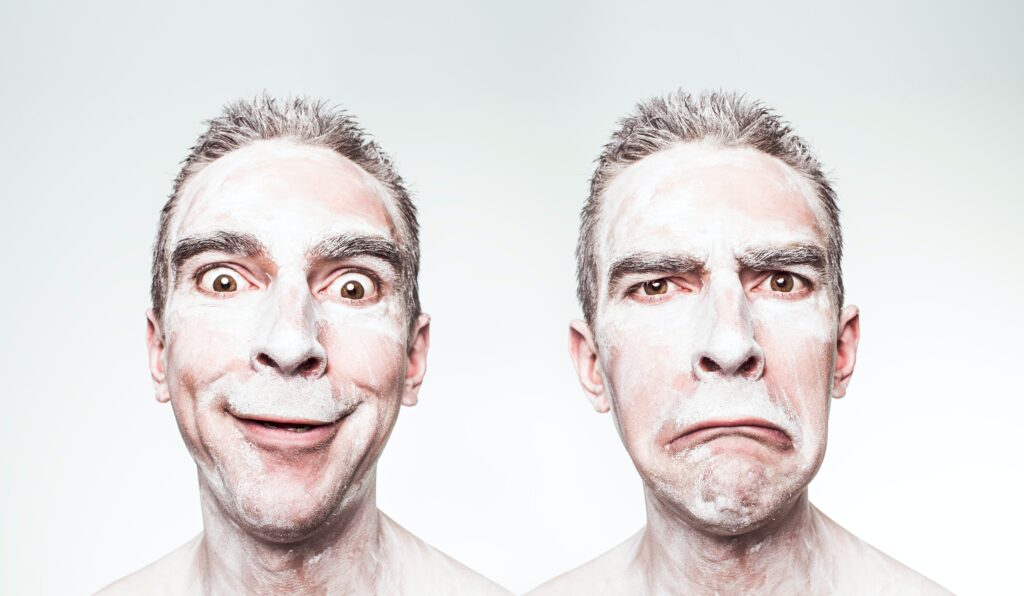7 Signs You’re Not as Happy as You Think

Right now, if someone asked you if you’re happy, what would you tell them? Take a moment to pause the video to answer this question to yourself or let us know in the comments. We’ll wait! You back? Cool. If you said “yes”, think about why you said yes. Are you truly content, or are you going through the motions and putting on a smile while you do? Well, today, we’re going to find out! Let’s learn about 7 signs you’re not as happy as you think, according to science. Let’s go!
Side Note: If you’re struggling with happiness or feeling content with your life, this is a serious matter. Please reach out to a trusted mental health professional to help navigate these thoughts and feelings.

#1 Comparison
In 1991, Ruut Veenhoven did a study on happiness where he proved one of the predictors of happiness is comparison. If you feel your situation is better than someone else’s, you’re probably happier. Now, apply it to your life. Say a coworker gets a promotion that you interviewed for, as well. You smile, congratulate them, but they ask “You’re not upset, right?” Let’s pause. Are you really happy? If you realized that promotion comes with more responsibility and longer hours that take away from your other priorities, you may actually be happy that they took the job. On the other hand, you might just be faking a smile to not be perceived as a sore loser. However, in both situations, happiness is solely based on who has the better situation. If you are curious if you’re happy with something in your life, ask yourself “Do I like this because I think it’s better than others’?” If the answer is no, you may not be as happy as you think.

#2 Inner Life
In the same year as his study, Veenhoven wrote a book called Questions on Happiness: Classical Topics, Modern Answers, Blindspots. In the book, Veenhoven brings up that first point again that external factors can predict happiness, but that’s only if the inner life matches with it. Veenhoven states “…[H]appiness tends to be quite stable through time and that happiness relates more strongly to psychological variables than socio-economic ones,” (p.11). Even if you have the best job, car, house, partner, and so on, it still won’t make you happy if you’re not in the right mental state or if you’re unhappy with yourself. It all starts and ends with YOU, so please be sure to take care of yourselves. Happiness will come. If you may be struggling with your mental health, you may not be as happy as you think.

#3 Stress
This seems pretty common sense, but we’re sorta obligated to say it. In 2008, the University of Mary Washington conducted a study on the relationship between happiness and stress. They found the two have an inverse relationship. This means when one is high, the other is low, and vice versa. So, if you’re stressed about an upcoming exam, anxious around your boss, have a first date coming up, have a few past due bills, and your parents have been calling since you haven’t been home to visit in the last few months, you probably aren’t very happy, even if you think you are. Take some baby steps to clear out that to do list! This can be a big reason why you’re not as happy as you think.

#4 Social Interactions
When you take work and your necessary errands and chores away from your week, what are you left with? Anything where you’re interacting with another person is a… drum roll… social interaction. In a meta-analysis of 44 different trials involving adults over the age of 65, it was found that the participants with the highest quality of life had recurring social interactions of at least three months, like an exercise class or meeting up with a book club. Now, everyone has a different level of social interaction they’re comfortable with. Whatever your level is, find something you’re comfortable with to help break up all the work and give your mind a break. This can help to promote true happiness if you really aren’t.

#5 Perception
Back to our buddy, Ruut Veenhoven. In his article Happiness, Veenhoven states that we don’t calculate happiness or unhappiness by our want versus reality. This means if we really want something and don’t have it, our brain doesn’t calculate this as unhappiness. Our brains infer happiness or unhappiness from our extreme moods. For example, if everyone at school is getting the newest iPhone but you’re still a few versions behind, your brain will infer happiness or sadness based on your reaction. If you’re super pissed and jealous about not getting the new iPhone, your brain will register this extreme mood and cause you to be unhappy about your current phone. On the other hand, if you’re a little relieved that you won’t have a more expensive phone bill and still content you have a working phone, your brain may register the lack of extreme emotion as happiness. It’s all how you look at things. If you tend to have a negative outlook on things, you may not be as happy as you think.

#6 Balance
If you’re a horror fan, I know you’ve heard this one. “All work, and no play, makes Jack a dull boy.” (Come on, it’s spooky season. We had to throw in a horror reference.) In the movie, The Shining, Johnny’s wife finds this phrase typed out from his typewriter over and over and over. Aside from staying in a haunted hotel, he worked himself crazy by not taking breaks. Happiness is kind of the same thing. It’s not about eliminating every little piece of negativity in your life. Jeremy Bentham, one of the first people to study happiness, defined happiness as “…the sum of pleasures and pains…”. Veenhoven agrees and states that happiness is “…the overall appreciation of one’s life-as-a-whole.” We all have had a crappy job or have gone through some stress here and there. Nothing will be totally perfect. Understanding this balance and adjusting your perception can help you truly be as happy as you think you are.

#7 Gratitude
In a study done in 2017 on the relationship between gratitude and happiness, a higher level of gratitude is a predictor of a higher level of happiness. In the study, participants were asked to think about a past want that they now have or the control. Those who thought of that past thing actually showed a higher level of happiness and hope for the future. An easy way to show gratitude is to say thank you for what you have. You can actually say it out loud or quietly in your head, but the point is that you say it. When you sit down to eat, wake up in the morning, or even when you have a little extra money to order a new Funko Pop, say that quick little thank you. This can help you to be just as happy as you believe you are.
Now, I don’t want to argue the meaning of life here, because we all know it’s 42, but I think all of us are searching for whatever makes us happy. Life may not all rainbows and butterflies, but it’s the way we make it through the storm that really shows our true satisfaction with life. Are there any other signs you’ve seen that show you may truly be unhappy? Share them in the comments below for us to all learn. As always, keep an eye on Psi for more Psych2Go content. See ya!
The references use in and to compose this article are listed below:
Schiffrin, H.H., Nelson, S.K. Stressed and Happy? Investigating the Relationship Between Happiness and Perceived Stress. J Happiness Stud 11, 33–39 (2010). https://doi.org/10.1007/s10902-008-9104-7
Steptoe, A. (2019). Happiness and health. Annual Review of Public Health, 40(1), 339–359. https://doi.org/10.1146/annurev-publhealth-040218-044150
Veenhoven, R. (1991). Is happiness relative? Social Indicators Research, 24(1), 1–34. https://doi.org/10.1007/bf00292648
Veenhoven, R. (1991). Questions on Happiness. Pergamon Press. Retrieved from http://hdl.handle.net/1765/16149
Veenhoven, R. (2003). Happiness. The Psychologist. Retrieved from http://hdl.handle.net/1765/8674
Witvliet, C. vanO., Richie, F. J., Root Luna, L. M., & Van Tongeren, D. R. (2018). Gratitude predicts hope and happiness: A two-study assessment of traits and States. The Journal of Positive Psychology, 14(3), 271–282. https://doi.org/10.1080/17439760.2018.1424924



Responses